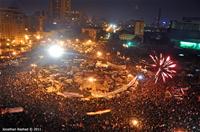Is it too late for the right choice?
Ralitsa Kovacheva, March 10, 2011
 The latest events in the Middle East and North Africa are often compared with the fall of communism in Central and Eastern Europe in 1989-1991. Many analysts and politicians believe that countries such as Tunisia and Egypt, as well as the others in the area who are seeking democratic changes, could learn from the experiences of former socialist countries. Undoubtedly. With the same force, however, the opposite is true - while looking to the southeast, we can understand more clearly the mistakes, which have been made during the transition to democracy. And even we can try to correct them because it is never too late to make the right choice.
The latest events in the Middle East and North Africa are often compared with the fall of communism in Central and Eastern Europe in 1989-1991. Many analysts and politicians believe that countries such as Tunisia and Egypt, as well as the others in the area who are seeking democratic changes, could learn from the experiences of former socialist countries. Undoubtedly. With the same force, however, the opposite is true - while looking to the southeast, we can understand more clearly the mistakes, which have been made during the transition to democracy. And even we can try to correct them because it is never too late to make the right choice.
I was provoked to these thoughts by an analysis of the Centre for European Policy Studies, entitled „Dignity, Democracies & Dynasties – in the wake of the revolt on the Arab street”. The author Michael Emerson focuses mainly on political scenarios for the future of Egypt, but he makes some interesting comparisons with similar events from other times and other parts of the world to describe the risks facing the country.
One is to repeat the mistakes of South-East Europe, where “the democratic model has been often deeply flawed by ‘state capture', namely the ability of democratically elected leaderships to appropriate for their parties or cronies large shares of the state’s economic assets. Somehow the electoral processes could not stop this, with democracy degenerating into switches between different leadership groups, each manipulating the rent from state assets.” And in turn, these groups use the profits to "reward and preserve ruling elites”. This phenomenon is widespread in the Arab world too, the author notes. He warns that if Egypt and Tunisia succumb to such temptations, it will distort democracy, and will deprive it of its main functions.
Democratic changes take time, like the cultivation of the English lawn - centuries-long care, successes and failures and learning from experience. Because "successful democracy relies on a standard institutional structure with checks and balances between the triad executive-legislature judiciary, coupled with deep political culture and civil society – rather than arriving as if by parachute with instant results from fresh, free and fair elections.”
And why democracy? Because, the author recalls, only three countries in the Group of the 20 most developed countries (G20) are not democracies - China, Russia and Saudi Arabia. This statistics clearly shows that modern democracy is the preferred model of governance and if the Arab countries also choose it to theocracy, it would only reinforce its dominance. China will remain a big exception, but despite the economic power, strengthened by authoritarian rule, “this may become an increasingly lonely position politically”, Michael Emerson states.
Where are we, the Bulgarians, in this picture? And why more than 20 years after the democratic changes, we continue to be straddling between democracy and socialism, to switch the same elites and their business friends and to expect a consequent “savior of the nation” to descend with a parachute? Obviously, there is no way to replace the socialist cooperative lands with 400 years old English lawns in only 20 years, but this is enough time to lay the foundations of that “standard institutional structure”, which holds democracy. The question is to make the choice. Once, finally and for good. And to defend that choice every 4 years to the polls. And politicians, who do not comply with it, to go into oblivion.
Having written this, I am fully aware that I'm proving axioms. Which, under the Bulgarian paradox, are doomed to be disproved by the local political geometry. And yet, even from the perspective of several generations it is too late, from a historical perspective it is never too late to make the right choice.